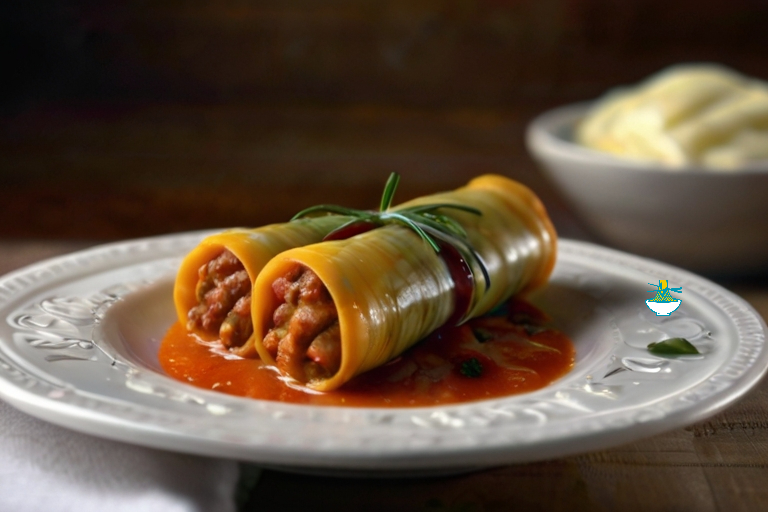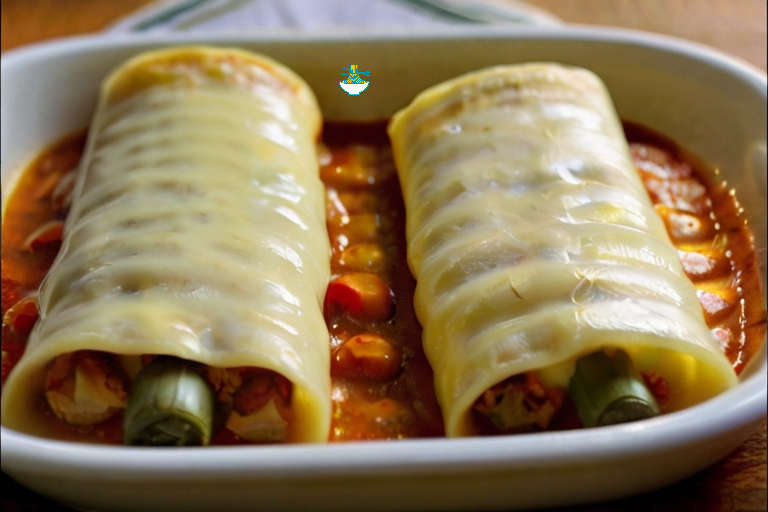Indulge in the rich flavors of Catalonia with our exquisite Catalonia Canelons. This traditional Catalan dish presents a tantalizing blend of flavors wrapped in delicate pasta sheets, meticulously prepared to perfection. Each bite unveils a symphony of savory minced meat, creamy béchamel sauce, and aromatic spices, lovingly enveloped in a blanket of pasta. Served piping hot, our Catalonia Canelons promise to transport you to the heart of Catalonia, where culinary heritage meets contemporary delight. Whether enjoyed as a cozy family dinner or a festive celebration, our Catalonia Canelons offer an unforgettable gastronomic experience that embodies the warmth and flavor of Catalan cuisine.
Here's a recipe for Catalonia Canelons:
Ingredients:
For the filling:
- 400g minced meat (pork and beef blend recommended)
- 1 onion, finely chopped
- 2 cloves garlic, minced
- 2 tablespoons olive oil
- 1/2 teaspoon ground nutmeg
- Salt and pepper to taste
- 200g cooked ham, diced (optional)
- 200g cooked chicken, shredded (optional)
- 200g cooked fish (cod, salmon, or a blend), flaked (optional)
- 100g grated Parmesan cheese
For the béchamel sauce:
- 50g butter
- 50g all-purpose flour
- 500ml milk
- Salt, pepper, and nutmeg to taste
- 100g grated Parmesan cheese
Other:
- 250g cannelloni pasta tubes, cooked according to package instructions
- Olive oil for greasing the baking dish

Instructions:
1. Prepare the Filling:
1- Heat olive oil in a large skillet over medium heat. Add chopped onion and minced garlic. Sauté until softened and fragrant.
2- Add minced meat to the skillet. Cook until browned, breaking up any clumps with a spoon.
3- Season the meat with ground nutmeg, salt, and pepper. If using, add diced ham, shredded chicken, or flaked fish to the skillet. Stir well to combine.
4- Cook for an additional 5-7 minutes until all ingredients are heated through and well incorporated.
5- Remove the skillet from heat and stir in grated Parmesan cheese. Set the filling aside to cool slightly.
2. Prepare the Béchamel Sauce:
1- In a separate saucepan, melt butter over medium heat.
2- Once the butter has melted, add all-purpose flour to the saucepan. Stir continuously to form a smooth paste (roux). Cook for 2-3 minutes, stirring constantly.
3- Gradually pour in milk, whisking constantly to avoid lumps.
4- Cook the sauce until it thickens and reaches a smooth consistency, about 5-7 minutes.
5- Season the béchamel sauce with salt, pepper, and nutmeg to taste. Stir in grated Parmesan cheese until melted and well combined. Remove from heat.
3. Assemble the Catalonia Canelons:
1- Preheat the oven to 180°C (350°F).
2- Grease a baking dish with olive oil.
3- Take each cooked cannelloni pasta tube and stuff it with the meat or fish filling using a spoon or piping bag. Arrange the filled cannelloni tubes in the prepared baking dish in a single layer.
4- Pour the prepared béchamel sauce over the filled cannelloni, ensuring they are completely covered.
5- Optionally, sprinkle additional grated Parmesan cheese on top of the sauce.
6- Cover the baking dish with aluminum foil and bake in the preheated oven for 25-30 minutes, or until the sauce is bubbling and the cannelloni are heated through.
4. Serve:
1- Once cooked, remove the aluminum foil from the baking dish.
2- Allow the Catalonia Canelons to cool slightly before serving.
3- Serve hot, garnished with fresh parsley if desired.
4- Enjoy the delightful flavors of Catalan-style cannelloni with your favorite side dishes or a crisp green salad.
Bon appétit!
Nutritional Values:
Providing exact nutritional values for recipes can vary based on factors such as specific brands used, portion sizes, and cooking methods. However, I can provide approximate nutritional information for the main ingredients in this Catalonia Canelons recipe:
For the filling (per serving):
- Calories: Approximately 250-300 kcal
- Protein: Approximately 15-20g
- Carbohydrates: Approximately 5-10g
- Fat: Approximately 15-20g
- Fiber: Approximately 1-2g
- Sodium: Varies based on added salt
benefits:
- Minced Meat: Provides high-quality protein, essential amino acids, iron, zinc, and B vitamins.
- Onion: Rich in antioxidants, vitamins C and B6, and dietary fiber, with potential anti-inflammatory and immune-boosting properties.
- Garlic: Contains compounds with potential health benefits, including allicin, which may help lower cholesterol and blood pressure.
- Olive Oil: A source of heart-healthy monounsaturated fats and antioxidants, with potential anti-inflammatory effects.
- Nutmeg: Contains antioxidants and compounds with potential anti-inflammatory and digestive benefits.
- Parmesan Cheese: High in calcium, protein, and vitamin A, supporting bone health and immune function.
For the béchamel sauce (per serving):
- Calories: Approximately 150-200 kcal
- Protein: Approximately 5-10g
- Carbohydrates: Approximately 10-15g
- Fat: Approximately 10-15g
- Fiber: Approximately 0g
- Sodium: Varies based on added salt
benefits:
- Butter: Contains healthy fats and fat-soluble vitamins like A, D, E, and K, with potential benefits for brain health and nutrient absorption.
- All-purpose Flour: Provides carbohydrates for energy and small amounts of protein and fiber.
- Milk: A source of calcium, vitamin D, and protein, supporting bone health and muscle growth.
- Parmesan Cheese: Same benefits as listed in the filling section.
For the cannelloni pasta tubes (per serving):
- Calories: Approximately 200-250 kcal
- Protein: Approximately 7-10g
- Carbohydrates: Approximately 40-50g
- Fat: Approximately 1-2g
- Fiber: Approximately 2-3g
- Sodium: Varies based on added salt
benefits:
- Durum Wheat Flour: Provides complex carbohydrates for sustained energy and small amounts of protein and fiber.
- Water: Essential for hydration and various metabolic processes in the body.
- Salt: Contains sodium, which helps maintain fluid balance and nerve function.
Please note that these values are estimates and may vary depending on specific ingredients and portion sizes used. It's always a good idea to refer to the nutrition labels on the ingredients you use for more precise nutritional information.


Comments